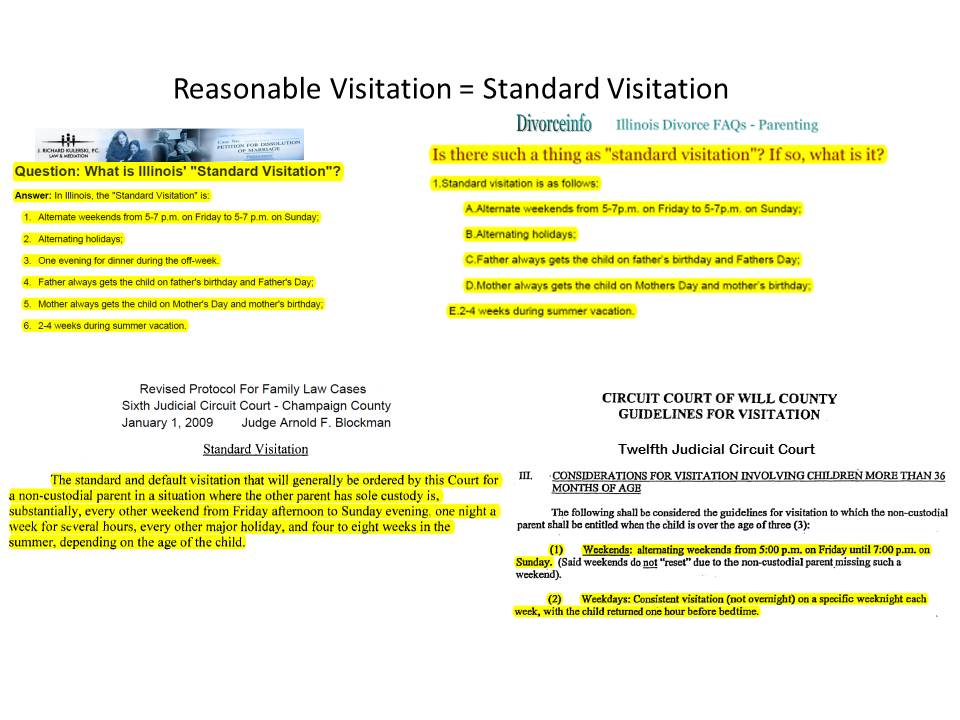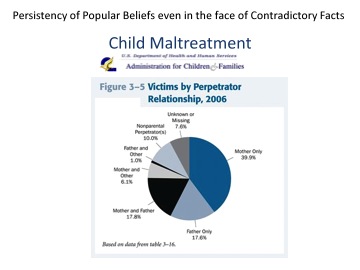Archivist and Researcher, University of Illinois
Social critics have coined a term most appropriate for our discussion regarding divorce and fatherhood. The term is vraisemblance, loosely translated as verisimilitude.
It is the appearance of truth. It is a set of beliefs so obvious and natural that it lies beyond question or criticism. It is the ultimate tautology; it is because it is.
Beliefs are assertions without quotation marks. Nobody knows where they came from or the basis for harboring such beliefs — but by God, they are true.
Myths abound regarding fatherhood and children’s best interests, especially in the context of divorce. (Read my related article, “Fragile Families“.) But, these myths apply beyond the special circumstances of never-married parents (not so uncommon anymore).
So what are some of the popular beliefs about fathers, children and divorce?
Based on a recent book by Jill Burrett and Michael Green (Chapter 3), I would like to share some of the more common myths.
Let me know which ones resonate with you especially in having to contend with the legal and professional community. No one is immune from beliefs without serious self-reflection.
- There is one primary or psychological parent.
- Children’s stability is dependent on the need to spend most of their time in one home.
- Shuttling children back and forth between homes is disruptive and unsettling.
- Infants under three should not spend nights away from their mothers.
- The parent who has done most of the direct child care is the better parent and should be designated as the sole custodial parent.
- In regards to visitation, it’s not the quantity of time that matters, but the quality of time.
- Joint child custody cannot work and should not be allowed if the parties can’t agree or are in conflict.
- Conflict – it takes two to tango.
- Limiting visitation is in the children’s best interest if there is conflict between parents.
- Fathers are ill equipped to care for children.
- Fathers are unimportant to the healthy development of children.
- Child support is much more important than visitation for children’s well-being.
As an example as to how myth operates, take the typical visitation schedule awarded by the court. In Illinois, like in many other states, the statutes call for “reasonable visitation” (750 ILCS 5/607).
The court claims that this vagueness is important because each case is unique and judicial discretion is required to craft a schedule most appropriate for the family. Most people would agree to the reasonableness of this assertion.
So, if each case is unique why does a cursory review of Illinois legal websites and the “Rules of Court” from various jurisdictions reveal a very similar interpretation of “reasonable visitation”?
How alternating weekends became the de facto standard in awarding visitation, let alone why it is considered as reasonable visitation, is unclear. The trial court in Re: The Marriage of Brophy (No. 79-741, Appellate Court of Illinois, First District, 96 Ill. App. 3d 1108) puts it succinctly:
[*1112] “I think visitation with the natural father should be in this case as the Court orders it in each and every case, * * *. Because that’s what I do in any case. * * * This is what I do on each and every occasion where I split children between two households. I’m not saying that I’m right. I’m only saying I am consistent. I may be consistently wrong in your opinion. So be it, but that’s what I do.”
So much for judicial discretion, eh? I’m sure that many of the myths listed above came into play in the court’s decision.
However, myth operates just below consciousness. It allows us to navigate through the complexity of life on a daily basis. But in this arena it can lead to seriously damaging social consequences that many of us are just beginning to see.
To add balance to this discussion, I would like to underscore a myth harbored by many fathers, especially those in fathers rights groups (I’m not going to win too many friends here).
13. Fathers are important because children need a male role model.
Hint: Fathers are important not because fathers are men, but because fathers are parents. I’ll go into this in greater detail at a later date.
What I would like to do in subsequent articles is to put the quotations back on the myths. Social critics call it “deconstruction.”
We need to explore where they came from and how they comport with what we know now from the research in social science, child development and family trends.
This is no easy task, and it may not even matter when truth revealed. How persistent are myths even in the face of contradictory facts? Show this to friends and note their reaction:
Some have told me when I showed this to them that this is because children overwhelmingly spend more time with mothers. I respond, “So, how much time do you think it takes to abuse a child?”
Let me know if you come up with myths I overlooked.
 My name is Robert Ferrer. I am a researcher and archivist at the University of Illinois Urbana-Champaign. Although it is in Computer Science, I also apply the same heuristic principles in my interests in child development and family law. As such I’ve been working with the Children’s Rights Council of Illinois and Illinois Fathers in providing the background information in law and child development research for various endeavors. I have been collecting, reading and pondering the wealth of information dealing with divorce and children from many perspectives, including child development, family studies and law.
My name is Robert Ferrer. I am a researcher and archivist at the University of Illinois Urbana-Champaign. Although it is in Computer Science, I also apply the same heuristic principles in my interests in child development and family law. As such I’ve been working with the Children’s Rights Council of Illinois and Illinois Fathers in providing the background information in law and child development research for various endeavors. I have been collecting, reading and pondering the wealth of information dealing with divorce and children from many perspectives, including child development, family studies and law.
I’ve been attending the sessions of the Illinois Family Law Study Committee where they are currently reviewing current statutes for massive revisions. I’ve been in communications with many of its members and have established a collegial relationship. I have attended conferences on Contemporary Families, PAS and ADR. I have written several proposals in the attempt to mitigate parental loss, more fully integrating current research with proposed policy.


 By
By 

Attorney Assisted California Center
This is really a wonderful article Robert. You have very nicely showcased the various myths that has prevailed for so long and would still continue. And yes you are right many of the myths listed above does come into play in the court’s decision.
Nice job Mr. Ferrer!
Nice done, Robert! Thanks!